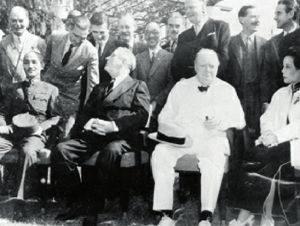Cairo Declaration 70 Years On
2013-04-29ByGaoHong
By Gao Hong

On December 1, 1943, at Cairos Mena House, a restaurant complex near the renowned Giza pyramids, history that changed the political landscape of the AsiaPacific after World War II was made. After several rounds of discussion, diplomats from China, Britain and the United States drafted the famous Cairo Declaration.
History is a mirror that reflects the difference between evil and justice. And history is also a force that disciplines the worlds order and behavior through legal instruments formed after international coordination. The Cairo Declaration is one of the footstones that marked history. It is influential and significant in terms of the state of todays Asia-Pacific issues, settlement of territorial disputes and the postwar international order.
Legal basis
According to the declaration, “Japan shall be stripped of all the islands in the Pacific” it had seized or occupied since the beginning of World War I, and that “all the territories Japan has stolen from the Chinese, such as Manchuria, Formosa (currently Chinese Taiwan), and The Pescadores, shall be re- stored to the Republic of China.”
On September 2 of 1945, Japan specifically accepted the provisions of the Potsdam Declaration, which was issued on July 26 by the United States, Britain and China, and signed the Instrument of Surrender. The Potsdam Declaration reaffirmed that the terms of the Cairo Declaration would be carried out, and stipulated that “Japanese sovereignty shall be limited to the islands of Honshu, Hokkaido, Kyushu, Shikoku and such minor islands as we determine” and its military forces “be completely disarmed.”
Recently, Japan attracted worldwide attention by aiming to reverse post-war history. Right-wing Japanese citizens opposed the Cairo Declaration, trying to stress the Treaty of San Francisco, which was signed on September 8, 1951, and which China never had admitted. To todays Shinzo Abe administration, the only way Japan can resume its past glory is to reestablish powerful military strength. The precondition of being armed is to amend its pacifist constitution, which requires a denial of its crimes of aggression. Therefore, distorting and rewriting history has become a political demand in todays Japan.
Unlike the Treaty of San Francisco, which included Chinas territory but not the Chinese Governments involvement, a substantial proportion of Cairo Declarations contents were written into the Potsdam Declaration, and had been implemented in the early post-war period through the allied forces occupation of Japan. The legal coherency of the Cairo Declaration far exceeds that of the Treaty of San Francisco, which China has opposed since its creation. Japan cannot use the latter treaty, which is illegal and one-sided, to oppose the Cairo Declaration if it wishes to remain on a sound international legal foundation.
The Cairo Declaration, Potsdam Declaration, Japans Instrument of Surrender, Sino-Japanese Joint Statement and ChinaJapan Peace and Friendship Treaty have proved the illegitimacy of Japans occupation of Chinese territory, which must be returned to China. Japan used to accept all these historical documents, but today, by denying the Cairo Declaration, Japan is negating the Potsdam Declaration, Japans Instrument of Surrender, Sino-Japanese Joint Statement and China-Japan Peace and Friendship Treaty. At the same time, Japans denial of the Cairo Declaration is a disavowal of its peaceful development path after World War II.
Significance
The Cairo Declaration not only decided Japans future following World War II, but also determined the post-war situation of Eastern Asia.
Along with Potsdam Declaration, the declaration belongs to a set of historic decisions that victorious nations made with the defeated Japan, and it is a document with legal effect that is accepted by the international community. Any attempt to deny the past is a betrayal of history, because it means to abolish the basis and legitimacy of todays international order.
The Cairo Declarations spirit and principles still need to be upheld today to protect world peace.
The United States is one of the signatories of the Cairo Declaration, and also one of the victorious nations of World War II. Washington decided to restore Japans territory to include those lands which it possessed prior to 1895.
Moreover, Japan should be encouraged to return to international community after becoming a country that poses no threat to world peace. The U.S. Government should heed its original stance if it wishes to protect peace and stability in East Asia.
Upholding the Cairo Declaration is of special significance to China. This document reaffirms that Taiwan and its affiliated islands including the Diaoyu Islands belong to China, serving as a historic evidence and a legal basis for Chinas sovereignty over the Diaoyu Islands.
History should never be forgotten. China asks Japan to face up to history and honor its political commitment to international society. At the same time, it hopes the United States, Britain and all countries that participated in drawing the blueprint of international order after World War II responsibly stand their ground. The guidelines and principles created to deal with Japan following World War II should continue to stand as lawful documents to which the international community abides. Considering the cyclical nature of history, all nations must try to avoid repeating the mistakes that led to previous conflicts and tragedies.
Due to the Japanese Governments denial of history, the China-Japan relationship stands at a difficult juncture. The political stalemate has rippled into economic, cultural and educational areas. Statistics show that bilateral trade slid 7.8 percent during January to September from the same period of 2012. Meanwhile, exchange activities had decreased 24.6 percent. Preventing bilateral relations from deteriorating has become an urgent task. China awaits Japans return to the negotiating table and adjusting bilateral relations to the right track.
In 1995, then Japanese Prime Minister Murayama Tomiichi made an apology to the victims of Japans aggression, affirming that Japan would reflect on its history and adhere to a path of peace. If todays Japanese rulers cannot address history correctly, the country will never be forgiven by war victims and their relatives. Ultimately, Japan will pay a high political cost.
Cairo Declaration and Related Documents
On December 1, 1943, after an intensive week-long meeting in the Egyptian capital, then U.S. President Franklin D. Roosevelt(1882-1945), British Prime Minister Winston Churchill (1874-1965), and Chinese leader Chiang Kai-shek (1887-1975) jointly vowed to continue their military actions against Japan to “restrain and punish it” until its“unconditional surrender.”
The statement was published simultaneously in Washington, D.C., London and Chinas wartime capital Chongqing on the day it was issued.
Delivered at a crucial juncture and against the backdrop of the irreversible retreat of the axis of the German and Italian forces on battlefields across the world earlier in 1943, the Cairo Declaration set the tone for an imminent victory in World War II, as well as the goals for the post-war world order.
On July 26, 1945, the Potsdam Declaration, issued by the United States, Britain and China, reaffirmed that the terms of the Cairo Declaration would be carried out.
By signing the Instrument of Surrender a month later, Japan specifically accepted the provisions of the Potsdam Declaration, which incorporated the terms of the Cairo Declaration.
“We, acting by command of and on behalf of the Emperor of Japan, the Japanese Government and the Japanese Imperial General Headquarters, hereby accept the provisions in the (Potsdam) declaration ... and subsequently adhered to by the Union of Soviet Socialist Republic, which four powers are hereafter referred to as the Allied Powers,” as stipulated by the Instrument of Surrender.
(Source: Xinhua News Agency)
